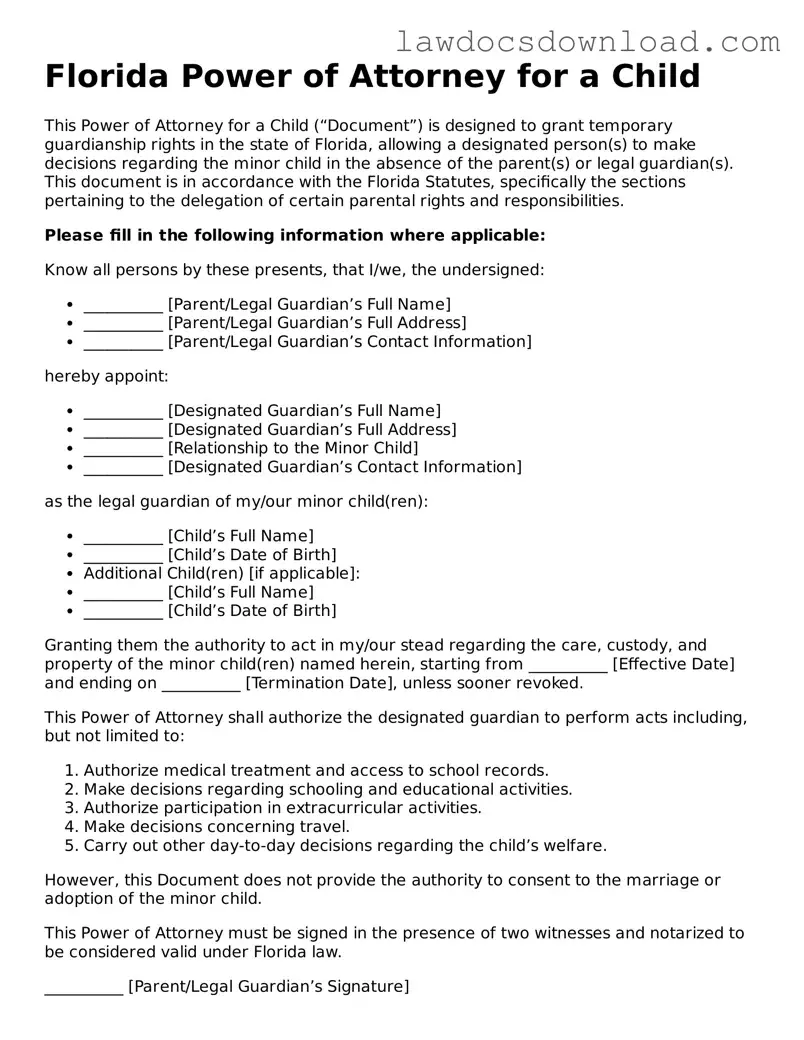Florida Power of Attorney for a Child
This Power of Attorney for a Child (“Document”) is designed to grant temporary guardianship rights in the state of Florida, allowing a designated person(s) to make decisions regarding the minor child in the absence of the parent(s) or legal guardian(s). This document is in accordance with the Florida Statutes, specifically the sections pertaining to the delegation of certain parental rights and responsibilities.
Please fill in the following information where applicable:
Know all persons by these presents, that I/we, the undersigned:
- __________ [Parent/Legal Guardian’s Full Name]
- __________ [Parent/Legal Guardian’s Full Address]
- __________ [Parent/Legal Guardian’s Contact Information]
hereby appoint:
- __________ [Designated Guardian’s Full Name]
- __________ [Designated Guardian’s Full Address]
- __________ [Relationship to the Minor Child]
- __________ [Designated Guardian’s Contact Information]
as the legal guardian of my/our minor child(ren):
- __________ [Child’s Full Name]
- __________ [Child’s Date of Birth]
- Additional Child(ren) [if applicable]:
- __________ [Child’s Full Name]
- __________ [Child’s Date of Birth]
Granting them the authority to act in my/our stead regarding the care, custody, and property of the minor child(ren) named herein, starting from __________ [Effective Date] and ending on __________ [Termination Date], unless sooner revoked.
This Power of Attorney shall authorize the designated guardian to perform acts including, but not limited to:
- Authorize medical treatment and access to school records.
- Make decisions regarding schooling and educational activities.
- Authorize participation in extracurricular activities.
- Make decisions concerning travel.
- Carry out other day-to-day decisions regarding the child’s welfare.
However, this Document does not provide the authority to consent to the marriage or adoption of the minor child.
This Power of Attorney must be signed in the presence of two witnesses and notarized to be considered valid under Florida law.
__________ [Parent/Legal Guardian’s Signature]
Date: __________
__________ [Designated Guardian’s Signature]
Date: __________
Witnesses:
__________ [Witness #1 Name]
__________ [Witness #1 Signature]
Date: __________
__________ [Witness #2 Name]
__________ [Witness #2 Signature]
Date: __________
Notary Public:
State of Florida)
County of ________)
On this ___ day of __________, 20__, before me, __________ [Notary’s Name], a notary public in and for said state, personally appeared __________ [Parent/Legal Guardian’s Name(s)], known to me (or satisfactorily proven) to be the person(s) whose name(s) is/are subscribed to the within instrument and acknowledged that he/she/they executed the same for the purposes therein contained. In witness whereof, I hereunto set my hand and official seal.
__________ [Notary’s Signature]
Notary Public for the State of Florida
My Commission Expires: __________

